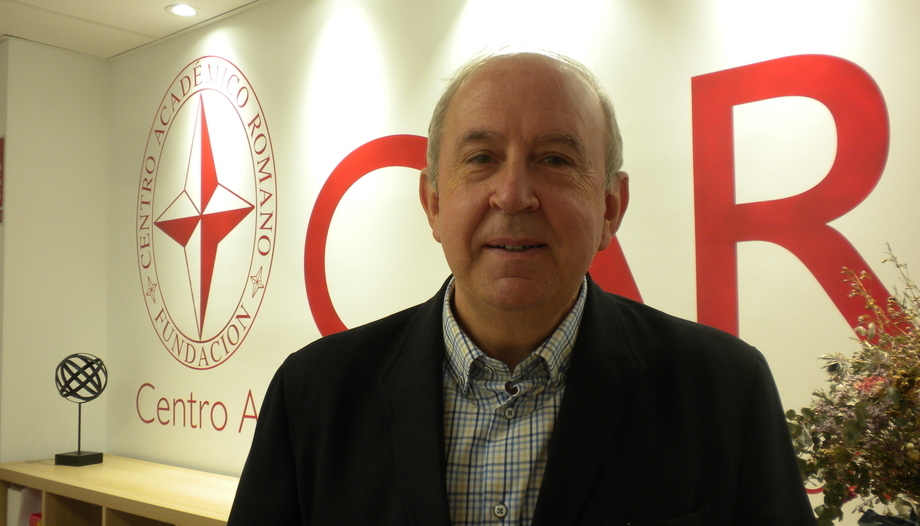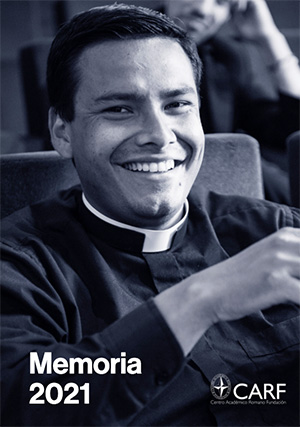Thanks to the work of the Centro Académico Romano Foundation (CARF) in its little more than 30 years of life, more than 40,000 people, including priests, seminarians, religious men and women, have been able to broaden their formation in these faculties to serve the Church in more than 130 countries. The reality of this project "that would make any economist's head explode," says Luis A. Rosales, "is possible thanks to many small donors. Many times we don't know how things are going to turn out and they do, and I always say that it is because we have three saints committed to this".
The CARF Foundation was born more than 30 years ago. What was the reason for this project?
-In relation to the birth of CARF, we can speak of two origins: a closer one, the establishment, as such, of the Foundation on February 14, 1989, and a more distant one. The distant one began in 1978, when John Paul II was elected Pope. Once in the See of Peter, John Paul II spoke with Álvaro del Portillo, whom he knew from the sessions of the Second Vatican Council and who had succeeded Josemaría Escrivá as head of the Opus Deito indicate to him that Opus Dei should establish a university in Rome.
St. John Paul II was aware of a key point of the spirit of Opus Dei that St. Josemaría, who had died shortly before, defended: love for the Church, for the Pope and for priests. Alvaro del Portillo replied that there were the ecclesiastical faculties in Pamplona, but John Paul II insisted on the need for the presence of a university in Rome. He also pointed out two characteristics that it had to have: on the one hand, solid doctrine and, on the other, studies in communication, because priests had to know about communication. To this was added the need to solve the residence of priests and seminarians who would go to study in Rome and Pamplona. That is to say, it would be necessary to have a seminary in Rome and another one in Pamplona, and residences?
They then began the search for a building for the university in Rome and for a seminary in Rome and another in Pamplona; and they also began to arrange loans, rentals, hiring of personnel, services... Until, in 1984, what is today the Pontifical University of the Holy Cross began.
Students began to arrive: priests, seminarians, religious men and women... and, in a few years, there was an economic collapse. The reason is simple: in Spain, for example, we have very clear "how much it costs" a priest; social security, salaries... etc., but in countries like Brazil, Benin, Kenya or Nigeria, a priest "costs" much less, they are ridiculous amounts for Italy or Spain also at that time. The amounts contributed by the superiors and bishops for their students were those and, evidently, with what can be allocated to a priest in those countries a private university is not paid, nor a residence in Rome or Pamplona... So, a collapse was produced: payroll and services could not be paid...
Faced with this panorama, the need for a foundation was seen and what we know today as CARF was born.
But CARF's raison d'être is not only economic...
-No. In fact, Alvaro del Portillo wanted this foundation to have two key missions: the first is that CARF should spread the good name of priests and foster priestly vocations... and the second is that it should be viable: that bishops around the world could have the opportunity to send priests and seminarians, or the superiors of religious orders their brothers and sisters, to study in these two ecclesiastical faculties.
Don Alvaro, who was a consultant to several Vatican congregations, was aware that there were priests who behaved badly, but also that, for every one of these who acted badly, thousands of others gave their lives for others, and not only in distant countries but also in New York, Rome or Berlin, and there was no right to the bad image that priests and the Church already had at that time.
For this reason, although financial help is always needed, the primary purpose of CARF is to foster vocations and spread the good name of priests, so if someone cannot give money, they can help by spreading the word about CARF.
In this sense, how does CARF help those who want to study in these faculties in Rome or Pamplona?
-The way it works is as follows: interested religious superiors (male or female) and bishops apply to the ecclesiastical faculties of the University of Navarra or the Pontifical University of the Holy Cross, requesting a place and, subsequently, if they cannot afford the cost of these studies, they ask for a scholarship.
From CARF we ask that, at least, they contribute what it would cost to maintain them in their countries of origin because "everything for free" is not formative. There are times when we are faced with the problem of places, because there is not always room in the residences and seminars. At Rome are covered, to a certain extent, by the national Colleges, but it is not the same thing. In the residences and international seminars they are very well cared for, it is a family and they appreciate it in a special way.
What countries do the students come from and are they all on scholarship?
-In the ecclesiastical faculties of the University of Navarra and the Pontifical University of the Holy Cross we find students from more than a hundred nationalities. In fact, the third country with the largest number of students is the United States. Logically, an American, a German or a Spaniard who can afford to pay for his studies is not given a scholarship.
What type of person collaborates with CARF?
-CARF is a Spanish foundation. Although it supports students of 133 nationalities, most of our members are Spanish. It is true that there is more and more variety, since the Internet is reaching everywhere.
Our channels are the newsletter, our website and social networks, through which donations from other countries have come in. Most of them are "humble" donations: many people who give 5 euros per month or 20 euros per year. The vast majority, 80%, are of this type of small contributions. This is very nice. Obviously large donations are needed because otherwise this is not viable, but most of them are small amounts.
CARF does not accept anonymous donations. They all have names and surnames; although we do not know the 90% of those who make these donations. They are many good people, who see the Bulletin in their parish or some publication in social networks. Once they help us we try to keep more or less a small follow-up from the foundation in case any issue arises. We can say that there is no cause-effect relationship between our work and what happens, and things happen. I put it down to the fact that there are three saints (St. John Paul II, St. Josemaría and Blessed Álvaro del Portillo) who are very determined that this should go ahead, because it's amazing. In any commercial activity the business is known, and here we don't know where most of it comes from.
The Ecclesiastical Faculties of Navarra and the University of the Holy Cross are linked to Opus Dei. How do they know CARF and its work outside the Work?
-The reality is that 85 % of the scholarship recipients have no relationship with Opus Dei. In our history we have worked with more than 1,200 dioceses and hundreds of religious congregations. This means that CARF is well known among bishops and religious superiors around the world. The prestige of the Universities of Navarra and Holy Cross is also very high. Bishops and superiors choose these faculties for many reasons and, with the help of CARF, they also solve issues such as housing and student care.
With more than 30 years of experience, what is your assessment of CARF's work?
-We are very happy. When Blessed Alvaro del Portillo entrusted the mission to this foundation, it was all a dream. It is a joy and a reason to thank God. It is really a marvel to see where we have reached. And looking to the future, where we will arrive will be wherever God wills.
No brand plan would have dreamed of this: to be known and to help people all over the world... and even less without being sure how this money, which is a lot, can come out, and, in spite of everything, in the end, things come out. They work out because we have three pairs of hands up there to help us.
Some figures
In its Memoria 2021, the Foundation Centro Académico Romano collects some of the main issues of its work.
Last year, the foundation obtained 9,715,000 euros through regular donations, wills, occasional donations and income derived from assets. Of this figure, 75.04% went to the formation of priests and seminarians and 0.8% to the board of trustees for social action.
In Rome
Priests and seminarians studying in Rome attend the Pontifical University of the Holy Cross, which has four ecclesiastical faculties: Theology, Philosophy, Canon Law and Institutional Social Communication, and a Higher Institute of Religious Sciences.
At the residential level, Rome is home to the Sedes Sapientiae International Seminary and the Altomonte and Tiberino Priestly Colleges.
Spain
The Ecclesiastical Faculties of the University of Navarra are composed of the faculties of Theology, Philosophy, Canon Law, and the Higher Institute of Religious Sciences.
In Pamplona, students can reside at the Bidasoa International Seminary and also at the Echalar, Aralar and Albáizar Colleges, together with the Los Tilos residence.
18,000 per year: approximately 11,000 euros for room and board, 3,500 euros for academic training, 2,700 euros for university tuition and 800 euros for human and spiritual formation.








